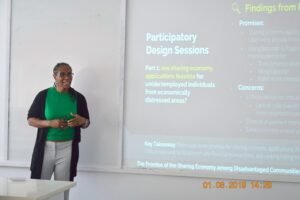

The Center for Information Technology and Public Policy (CITAPP)
International Institute of Information Technology Bangalore (IIITB)
organized a talk titled
Designing and Envisioning Digital Tools for Low-resource Job Seekers in the U.S.
by
Tawanna Dillahunt
University of Michigan
2:00 pm – 3:30 pm on 1st August 2019 (Thursday)
Venue: Room 310, IIITB campus
26/C, Electronic City, Hosur Road, Bangalore
About the talk:Today’s Information and Communication Technologies (ICTs) are designed to address one of society’s most pressing problems—unemployment. These technologies support job seekers’ ability to search for jobs, create resumes, highlight skills, share employment opportunities, and even transport to work and job counseling. However, the benefits of employment tools and technologies are unequally distributed and provide limited advantages for certain populations in our society. Like other valuable resources, ICTs have done little to support individuals with limited knowledge, skills, or experience to leverage them and who often face geographic and social isolation. Without an understanding of how people from low-resource settings in the U.S. use ICTs for job seeking, the same employment inequalities that occur offline will be repeated in online contexts.
In this presentation, I will discuss the results of several studies that investigate how ICTs could improve employability, particularly among job seekers with limited digital skills, education, and income, and those who are geographically and socially isolated. I will also discuss new principles for fostering innovations among these populations and identify barriers for designers and technologists to address in the future.
Speaker Bio: Tawanna is an Assistant Professor at the University of Michigan’s School of Information and holds a courtesy appointment with the Electrical Engineering and Computer Science Department. She leads the Social Innovations Group (SIG), an interdisciplinary group of individuals whose vision is to design, build, and enhance technologies to solve real-world problems affecting marginalized groups and individuals primarily in the U.S. Her current projects aim to address unemployment, environmental sustainability, and technical literacy by fostering social and socio-technical capital within these communities.
Tawanna holds a M.S. and Ph.D. in Human-Computer Interaction from Carnegie Mellon University, a M.S. in Computer Science from the Oregon Health and Science University, and a B.S. in Computer Engineering from North Carolina State University. She was also a software engineer at Intel Corporation for seven years.
